Stay Informed
Popular Articles
- Hiatal Hernia: Hidden Cause of Chronic Illness
- Small Intestinal Bacterial Overgrowth (SIBO)
- Applied Lymphology: Unlocking the Secret to Pain Relief
- An Introduction to Constitutional Iridology
- The Low Down on Liver Detoxification
- An Energetic and Emotional Approach to Cancer
- Fat Facts
- Marrow in the Bones
- Blood Type and Nutrition
- Cardiac Herbs: Beyond Hawthorn
Quick Search
The School of Modern Herbal Medicine




Tending the Garden of Our Mind
- 6/17/2015
- Categorized in: The Herb Guy (Steven Horne)
As the photos that accompany this article suggest, I love to garden. The past three years I've been able to greatly expand the garden areas on my one acre using some wonderful techniques I've learned in the past couple of years. Learning how to garden in the desert where I live has not been easy. It's very different than trying to garden in northern Utah where I'm from. I've had to content with heavy clay soil, extreme heat (it's over 100 degrees as I write this) and wind-borne weed seeds.
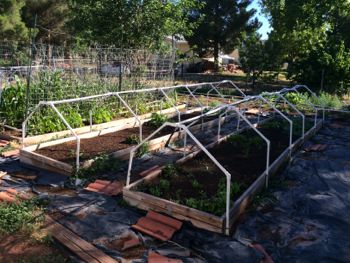 Even though I'll tell you a little bit about my garden in a moment, my garden is not the focus of this article. I want to talk about the lessons I learned this year from gardening that apply to my mind and my life.
Even though I'll tell you a little bit about my garden in a moment, my garden is not the focus of this article. I want to talk about the lessons I learned this year from gardening that apply to my mind and my life.
The weather warmed up early this year and I already had some raised beds ready which I got planted clear back in March. The picture on the right shows these beds which I have heavily amended the soil in with both compost and sand for the purpose of growing root vegetables like beets, carrots and turnips. I've also installed an overhead spraying system to water the beds, which is working really well.
Pest Problems
Unfortunately, I had a huge invasion of earwigs this year. They ate all my seedlings. I saw plants coming up and then would go out and find they were all gone, chewed to the ground by the earwigs. They like to hide under the black plastic mulch I use between the beds, so I sprayed Orange Guard under the plastic (as I've done before) thinking this would take care of it, and replanted.
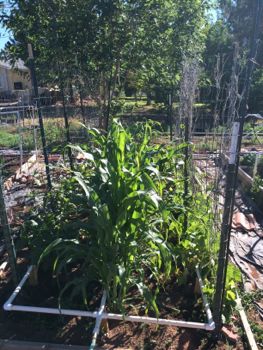 Unfortunately, it didn't take care of it. There were so many earwigs in my garden that they were actually eating plants I bought at the nursery. They completely destroyed four parsley plants in rapid succession and numerous pepper plants (which they normally leave alone). They ate all my melon seedlings and they ate all my strawberries (while they were still green).
Unfortunately, it didn't take care of it. There were so many earwigs in my garden that they were actually eating plants I bought at the nursery. They completely destroyed four parsley plants in rapid succession and numerous pepper plants (which they normally leave alone). They ate all my melon seedlings and they ate all my strawberries (while they were still green).
I also have gophers on my property. I don't like killing things, but after trying several gopher repellent products I finally broke down and used traps that catch and kill them (sort of like mouse traps do for mice). The gophers this year ate half of my Jeruselm artichokes, some of the potatoes I planted and a few other crops to boot.
This was all on the top of the bindweed (a wild morning glory), kochia, mallows and other weeds I normally contend with each year. Last year was the year of the caltrops, also known as Tribulis, puncture vine and goatheads. When the rains came towards the end of last summer from the hurricane on the West coast they went crazy, so I had so many of them that the shoes I wear in the garden have so many caltrop seeds stuck in the bottom of them that I'm walking on a layer of the seeds.
A Message from My Garden About My Life
Bottom line is that I don't think I've ever felt so frustrated about my garden as I did this spring. However, I believe that everything we experience in life is for our good. The experiences we have that appear negative contain hidden life lessons for us if we view them in the right manner. So I started asking, what is this trying to teach me?
The answer came rather rapidly—you're too tolerant. This is a lesson about your mind and your life. Here's what was "downloaded" to me. The garden represents your mind. The seeds you plant are the ideas you have about the things you want to accomplish in your life. When you conceive of an idea you are creating a seed, which if you cultivate carefully, will help you manifest that idea and bring it into reality.
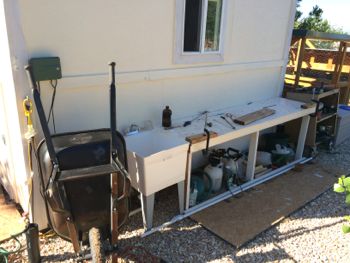 That idea made a lot of sense to me because last year, I got the idea to build a garden shed, with a workbench and an outdoor sink beside it. I drew up the plans, got the materials, and went to work on it. This year it's there in the very spot where I first envisoned it. I also wanted to put a chicken coop behind it. I was going to build it, but ran across someone who was selling one that fit perfectly in the space I had pictured having a chicken coop, and it cost me less than it would have cost me to build one. So, I've many times planted the seeds of ideas in my mind, nurtured them and seen them bear the fruit of becoming a reality in my life.
That idea made a lot of sense to me because last year, I got the idea to build a garden shed, with a workbench and an outdoor sink beside it. I drew up the plans, got the materials, and went to work on it. This year it's there in the very spot where I first envisoned it. I also wanted to put a chicken coop behind it. I was going to build it, but ran across someone who was selling one that fit perfectly in the space I had pictured having a chicken coop, and it cost me less than it would have cost me to build one. So, I've many times planted the seeds of ideas in my mind, nurtured them and seen them bear the fruit of becoming a reality in my life.
But my answer didn't stop there. The weeds represent all the ideas that other people and the world are trying to plant in your mind. When you allow the thoughts and ideas of other people to get planted in your brain, they crowd out your own ideas and keep you from succeeding at getting what you really want. You can't tolerate the weeds because they produce more seeds and spread. You've got to be diligent in guarding both your garden and your mind from the weeds.
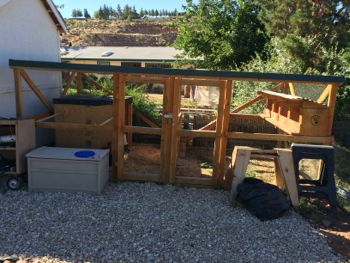 My "downloaded" answer continued. The insects and the gophers represent the people who see what you are doing and want to receive the fruits of your ideas and labor without having to do the work themselves. You think you're being kind by trying to help them, but you're really just preventing them from doing the work they need to do to cultivate the garden of their own ideas and desires. You have to adopt a zero tolerance policy for allowing others to rob you of the fruits of your labors.
My "downloaded" answer continued. The insects and the gophers represent the people who see what you are doing and want to receive the fruits of your ideas and labor without having to do the work themselves. You think you're being kind by trying to help them, but you're really just preventing them from doing the work they need to do to cultivate the garden of their own ideas and desires. You have to adopt a zero tolerance policy for allowing others to rob you of the fruits of your labors.
I could really see how this applied to me. So, I decided to make the garden a metaphor for my mind. I got some organic pesticides and went out night after night for two weeks after dark spraying earwigs. It took two weeks of consistent effort but I finally got them under control. I also started setting out the gopher traps. I've trapped seven in the last two months. (I really dislike it, but they destory the garden if I don't.)
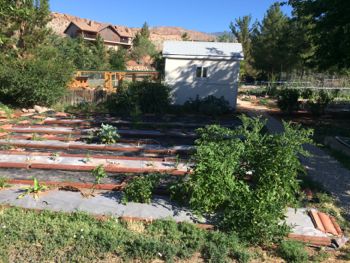 At the same time I started diligently watching my thoughts. I started weeding out anything that was a negative thought or focusing on something I don't want to create in my life. I examined very carefully what thoughts I wanted to have, since they are the seeds that ultimately yield my life. I also started setting up better boundaries to avoid allowing other people to take my time, energy and resources. The result is that I'm feeling happier and healthier, getting more of what I want accomplished and my garden looks better, too.
At the same time I started diligently watching my thoughts. I started weeding out anything that was a negative thought or focusing on something I don't want to create in my life. I examined very carefully what thoughts I wanted to have, since they are the seeds that ultimately yield my life. I also started setting up better boundaries to avoid allowing other people to take my time, energy and resources. The result is that I'm feeling happier and healthier, getting more of what I want accomplished and my garden looks better, too.
So, I encourage all my readers to pay attention to the garden of your mind. Cultivate the thoughts you want to cultivate and weed out the thoughts you don't want. I've thought a lot about the words to the song by Billy Joel, "I don't care what say, this is my life; go ahead with your own life, leave me alone." Don't let people meddle with your thoughts, ideas, dreams and goals. Don't let them make you feel guilty when you manifest something good in your life, either. Protect your garden and life from the varments who want to steal what you produce.
Comments on Desert Gardening
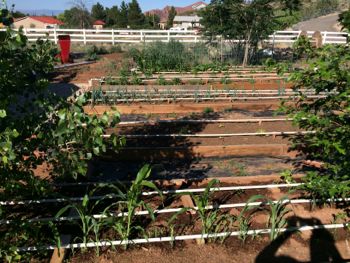 OK, if you're still with me, I'll share with you some of the things I've done that are helping me to grow a great garden in this hot desert climate. The raised beds have really helped. I've had several dump truck loads of compost hauled onto the property and I've tilled a lot into the soil of my raised beds. I've also added calcium sulfate, which improves the soil texture. I've now got 10 raised beds about 4 feet wide and 20 feet long. (I had 5 last year and finished 5 more this year with the help of my interns.)
OK, if you're still with me, I'll share with you some of the things I've done that are helping me to grow a great garden in this hot desert climate. The raised beds have really helped. I've had several dump truck loads of compost hauled onto the property and I've tilled a lot into the soil of my raised beds. I've also added calcium sulfate, which improves the soil texture. I've now got 10 raised beds about 4 feet wide and 20 feet long. (I had 5 last year and finished 5 more this year with the help of my interns.)
Watering has been a big issue. If you don't water things, they die. I've been using drip irrigation but it hasn't worked well for some applications. So, last year I heard about a system of drilling small holes in PVC pipe and using it for irrigation. It's working really well and all five of my new raised beds have this type of irrigation installed.
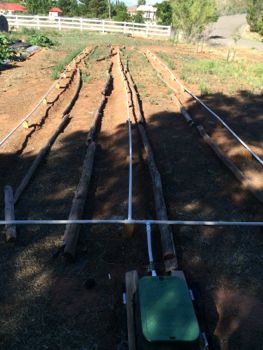 I've also built a new area that I'll be planting next week where I plan to grow the three sisters—corn, beans and squash using this new irrigation system. I've created three rows 60 feet long and installed the pipe to irrigate them.
I've also built a new area that I'll be planting next week where I plan to grow the three sisters—corn, beans and squash using this new irrigation system. I've created three rows 60 feet long and installed the pipe to irrigate them.
Two years ago I discovered this amazing paper mulch that I can put down to control weeds. My tomatoes, peppers, squashes, melons and other plants are planted in smaller beds that are not framed but are covered with the paper mulch. I cut holes for the plants to grow through and put drip irrigation to each plant. Below, you see my area for growing squashes, melons and cucumbers. I've put black plastic down the center where the irrigation lines run and the plants spread out all over the whole area.
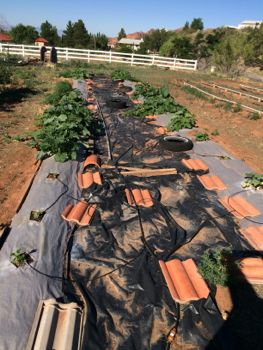 There's also a photo on the right above where you can see tomatoes, peppers, eggplants and other plants in similar rows covered with paper mulch, with black plastic between the beds. (My new shed is in the background.)
There's also a photo on the right above where you can see tomatoes, peppers, eggplants and other plants in similar rows covered with paper mulch, with black plastic between the beds. (My new shed is in the background.)
I try to do a folar feeding once a week. I found a book that indicated what mineral deficiencies are present in the soil that cause certain weeds to grow and my soil is definitely deficient in calcium. So, I soak eggshells in vinegar and water to extract the calcium (or mix coral calcium powder with vinegar and water if I don't have enough egg shells) and mix that with a tablespoon of kelp emulsion, an ounce of colloidal minerals, about five drops of Sunshine Concentrate (it makes water "wetter") and a teaspoon of Nature's Fresh enzymes. It really has improved my yeild of peppers, tomatoes and other fruits.
I'm also having good luck with growing pototoes in old tires. I put the potato at the bottom of the tire along with a drip line. Then a fill the tire with mulch as the potaotes start to grow. It's pretty fun.
 I could write a lot more about my garden, but I've really got to wrap this up so I can get home and enjoy it. In particular I like to enjoy the new sitting area we created under the big tree in my back yard.
I could write a lot more about my garden, but I've really got to wrap this up so I can get home and enjoy it. In particular I like to enjoy the new sitting area we created under the big tree in my back yard.
